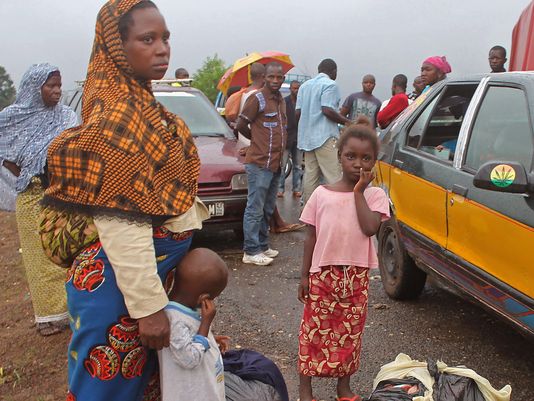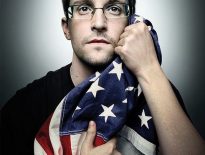FREETOWN, Sierra Leone – A leading physician in Sierra Leone’s fight against Ebola has died from the disease, an official said Wednesday, as it emerged that another top doctor last month was considered for an experimental treatment.

In this photo taken on Tuesday, Aug. 12, stranded people stand at a roadblock that separates Guinea and Sierra Leone, and works as a makeshift border control checkpoint at Gbalamuya-Pamelap, Guinea. As Guinea closed its border with Sierra Leone over the weekend in an attempt to halt the spread of the deadly Ebola virus, people and goods were not able to cross to either side.
(Photo: Youssouf Bah AP)
Ultimately, doctors decided against using the drug and he died before he could be airlifted out of the country. There was very little of the experimental treatment available, which has stoked debate about ethics on who should get it even though it hasn’t been tested in humans. There is no way of knowing if the drug, known as ZMapp, made a difference in the few people who have gotten the now-exhausted supply of the drug.
Only two Americans and a Spaniard have received ZMapp, an unproven and experimental anti-Ebola drug made in the United States. That has stoked an ethical debate about who should receive the limited doses of the drug. The Spaniard died on Tuesday.
The World Health Organization has tallied another 56 deaths and 128 new cases of Ebola in West Africa from just Sunday and Monday alone. The biggest jump — 32 new deaths and 71 cases — occurred in Liberia.
The numbers issued Wednesday now bring the toll from the disease to 1,069 deaths and 1,975 cases. The outbreak is largely centered in Guinea, Liberia, and Sierra Leone with some additional cases and deaths in Nigeria.
Many of the dead are health workers, who are often working with inadequate supplies and protection.
Doctors considered giving ZMapp to Sheik Humarr Khan, the chief doctor treating Ebola in Sierra Leone who had come down with the deadly disease, but eventually decided against it “after taking (his) clinical and treatment conditions into account,” officials at the WHOI said in an email to The Associated Press on Wednesday.
WHO then tried to arrange airlifting Khan out of the country, but “his condition had deteriorated too much to be transported safely.” He died July 29.
Now doses of ZMapp have been allocated to two Liberian doctors and could arrive as soon as Wednesday in Liberia, according to Liberian Health Minister Walter Gwenigale. They would be the first Africans known to receive the treatment.
The California-based company that makes the drug, Mapp Pharmaceuticals, has said that its supplies are now exhausted, and it will take months to make even a modest amount.
Canada announced Tuesday it would donate 800 to 1,000 doses of its experimental Ebola vaccine developed by the Public Health Agency of Canada to the World Health Organization.
“The trouble is, of course, with this very, very limited number of vaccines, who would you give that to?” said Gregory Taylor, deputy head of the agency.
He said the agency has been advised that it makes the most sense to give the vaccine to health care workers in Africa who are among the most vulnerable because of their close contact with Ebola patients.
Guinea is considering asking for access to the vaccine, according to Communications Minister Al Houssein Makanera Kake.
Unlike the use of ZMapp, which is being given to only a handful of people and is unlikely to yield significant information about the drug’s effectiveness, the vaccine could be tested in a small, but more rigorous field trial.
“It gives us an opportunity to test the vaccine in an outbreak situation in populations that are at risk,” said David Heymann, who headed the WHO’s response to SARS and is now professor at London School of Hygiene and Tropical Medicine. “However the study design will be very difficult because you have to make sure the health workers don’t lapse in their infection control, and then you can’t ever be sure it was the vaccine that protected them.”
Highlighting how dangerous the response of health workers is, yet another doctor in Sierra Leone, Modupeh Cole, died on Wednesday, according to Sidie Yayah Tunis, director of communications for the Ministry of Health and Sanitation. Cole, trained in the U.S., was one of the top doctors working in the Ebola isolation ward in Connaught Hospital in Freetown, the capital. He tested positive for the disease last week and was transferred to the eastern district of Kailahun, where Doctors Without Borders is running a treatment center.
Cole’s sickness spread fear throughout the hospital where he worked, and staff there went on strike Friday and Saturday after learning that he had tested positive for the deadly disease. They returned to work on Sunday.
Both Cole’s and Khan’s deaths are a major blow to Sierra Leone’s health system, which is struggling to cope with the deadly outbreak.
The outbreak, which was first identified in March in Guinea, has strained the resources of the poor West African countries it has hit and of the international community, which is struggling to mobilize enough qualified doctors.
Contributing: Dennis Kelly, USA TODAY





